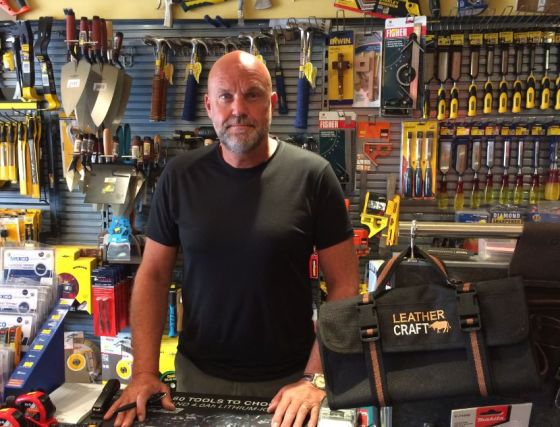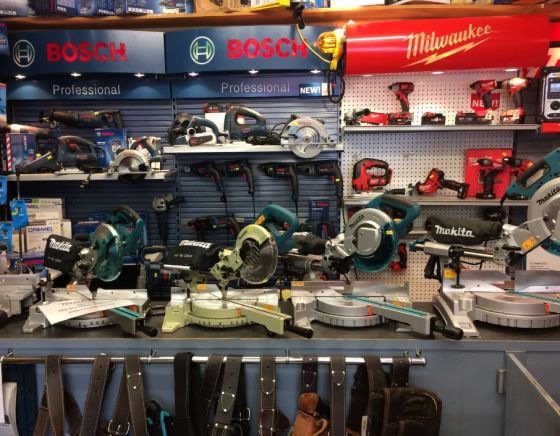
What is the state of the tools market from the viewpoint of the tool stockist? Torque visited Main Road Tools of Romford, Essex for the perspective from the front line…
Torque Magazine turns up on a busy mid-week morning at Romford’s Main Road Tools and it isn’t long before we’ve got a mug of tea in-hand and are listening to an honest appraisal of what it’s like to run an independent tool stockist in 2017.
Main Road Tools is open seven days a week and located on – you guessed it – a busy main road, less than a mile from Gallows Corner. Charles Fancourt is the straight-talking owner of the ten year old business and during our chat we cover the internet, how difficult it is to get started, suppliers and more.
For any business selling virtually any product, the internet looms large and it’s no different for independent tool stockists. Pricing is the key area where the internet has had an impact, Fancourt says.
“Online is a pricing structure. People come in after seeing a product and a price on the internet and it is when you get to speak to them that you can explain the advantages of buying the product from us. If they come here they get it from stock and walk away with it there and then, etc.
“Customers need telling why they should buy from us, but they wouldn’t come into the shop in the first place if they didn’t want to buy from us. Ultimately, all online has done is lower the price.
“Youngsters buy everything online. But that will change. They will get a bit older and will want the service and not just the price. We can’t be £20 or £30 more than online prices, but we can be £10 more because customers know they will get the service.
“My view of the internet is you can’t play at it. You have to go full in or not at all. There are a lot of busy fools – lots of companies have a big turnover online but are they making much profit?”
Service is a key weapon for stockists like Main Road Tools, he argues: “You have to look after your customer base. Your customers will tell everyone else working on the site how you have treated them. Word of mouth gets around. It’s the same as a restaurant, if you get a great meal and poor service then you won’t go back.”

Main Road Tools says it is often cheaper than big chain stores like Screwfix and Toolstation. “We are open to the public, but most our customers are in the trade and they half know it all before they come in. So you really have to know your stuff – customers only have confidence in you if you know what you are talking about.”
The store’s location has played its part in Main Road Tools’ success: “You certainly pay for a good position on the high street and that’s something you can’t charge back to the customer – they don’t care that you pay extra for it. We could have set up on an industrial estate, but it would have taken longer to get going.”
IN THE BEGINNING
Main Road Tools’ boss Charles Fancourt is characteristically honest about the early days of the business. “If I knew then what I do now, I wouldn’t do it. Yes it worked out, but we had nowhere near enough money. We started out with £50,000, but we needed £80,000 minimum. We had everything staked on the business, including the house.
“You have to make it work. It was just me and the wife here and all the product we had was on show. There was no backroom stock whatsoever.”
And aside from stock, the shop itself needs kitting out: “There are alarm systems, ram bars and all that stuff you don’t think of.”
A key moment in the early days of Main Road Tools came when a nearby building site was hit by thieves. Fancourt picks up the story: “It was three weeks after we opened and there was a break in at the building site over the road. They lost thousands of pounds of equipment so they came to us. The problem was they wanted far more stock than we had in those early days.
“But I couldn’t let the business opportunity go. They went off and had their breakfast and that gave me an hour to pull everything together.”
After some urgent phone calls and enlisting his father-in-law to drive to his suppliers and pick up the stock, they managed to pull the order together in time – which they then wheeled to the building site in a wheelbarrow.
The day-to-day running of the shop is down to two full-time staff and a part-timer. Duties include everything from imparting advice to customers and offering tea for regulars to turfing non-customers off the shop’s front car park. “It seems harsh, but if a customer sees there are no parking spaces then he could be off to another tool shop and we’ve lost that business.”
Main Road Tools doesn’t have any account customers, believing that most customers use company credit cards for goods. Fancourt says you may miss out occasionally, but: “If someone owes you £200 then he won’t come in for a £7 saw – that’s a wasted sale.
“There is a social aspect and we get tradesmen come in on the way to work,” Fancourt tells Torque Magazine. “They come in for a chat and then they might see a product and remember they could do with one of those.
“People like to buy from people and that won’t ever change. If you are talking to your customers then you’ll get to hear about new tools that come onto the market and whether they are any good. They are the ones using them.”
THE SUPPLIER RELATIONSHIP
Working closely with wholesalers is important for stockists, but it can be a challenge to get manufacturers and suppliers to see things from the stockist perspective, the Main Road Tools boss tells Torque Magazine.
“It frustrates me when you see online stockists selling products cheaply from your suppliers. Then when you speak to the sales reps they say ‘I don’t know how they do it’. That’s frustrating, because they must know.
“You don’t always get the support when you are an independent stockist, but without us pushing the product in the first place, it wouldn’t sell. Independents like us build up brands that then head into the big chains like Screwfix when they become successful.”
Return policies from certain brands and suppliers are also a source of frustration for stockists like Main Road Tools: “We often don’t get the support that the big box shifters get. Customers can come in here, pick up the product, see how heavy it is, talk about it… manufacturers don’t give the credit and support to the independents, who can get overlooked.”
Good relationships with wholesalers are vital, Fancourt adds: “Wholesalers can give you better prices than manufacturers. They will give you a favourable rate if you order, say, 100 saws in a month. We could never take 100 in one order because of space… but if you take ten each time and do it often then before you know it you have ordered 100 in a month. It takes time to build that kind of relationship up with wholesalers.”
Looking ahead, Fancourt has big plans for Main Road Tools: “We struggle with room. I would stock nuts and bolts if we had space, and we’d have more workwear too – there is profit in it. So we are planning to expand and there is a bigger shop is in the pipeline.”
Watch this space.
Main Road Tools: 01708 763666
Previous Torque stockist interviews:
If you’re a tool, fastener or related industry stockist and want to feature in Torque Magazine contact us via jonathon@torque-expo.com.
This article was originally published in the September 2017 edition of Torque Magazine. Read the full magazine online here or subscribe for free.



